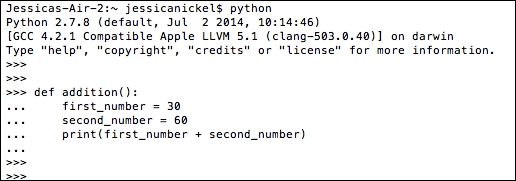Basic functions
We learned at the beginning of this chapter that the first electronic calculator had four basic functions: addition, subtraction, multiplication, and division. We will be working on programming each of these functions, and we will also learn a fifth mathematical function that we can program for our calculator called modulo.
Through the beginning of this chapter, we will use the addition() function as our example. Once we have created and tested an addition() function that does what we want it to, we will then build our other functions.
Let's return to our example of the addition function in Chapter 2, Variables, Functions, and Users. Recall how we programmed this function:

The addition function in the preceding screenshot does perform proper addition and prints the answer. However, there are problems with designing an addition() function this way. One problem is that the program can only add the same two numbers over and over again. Another problem is that, in this program,...































































